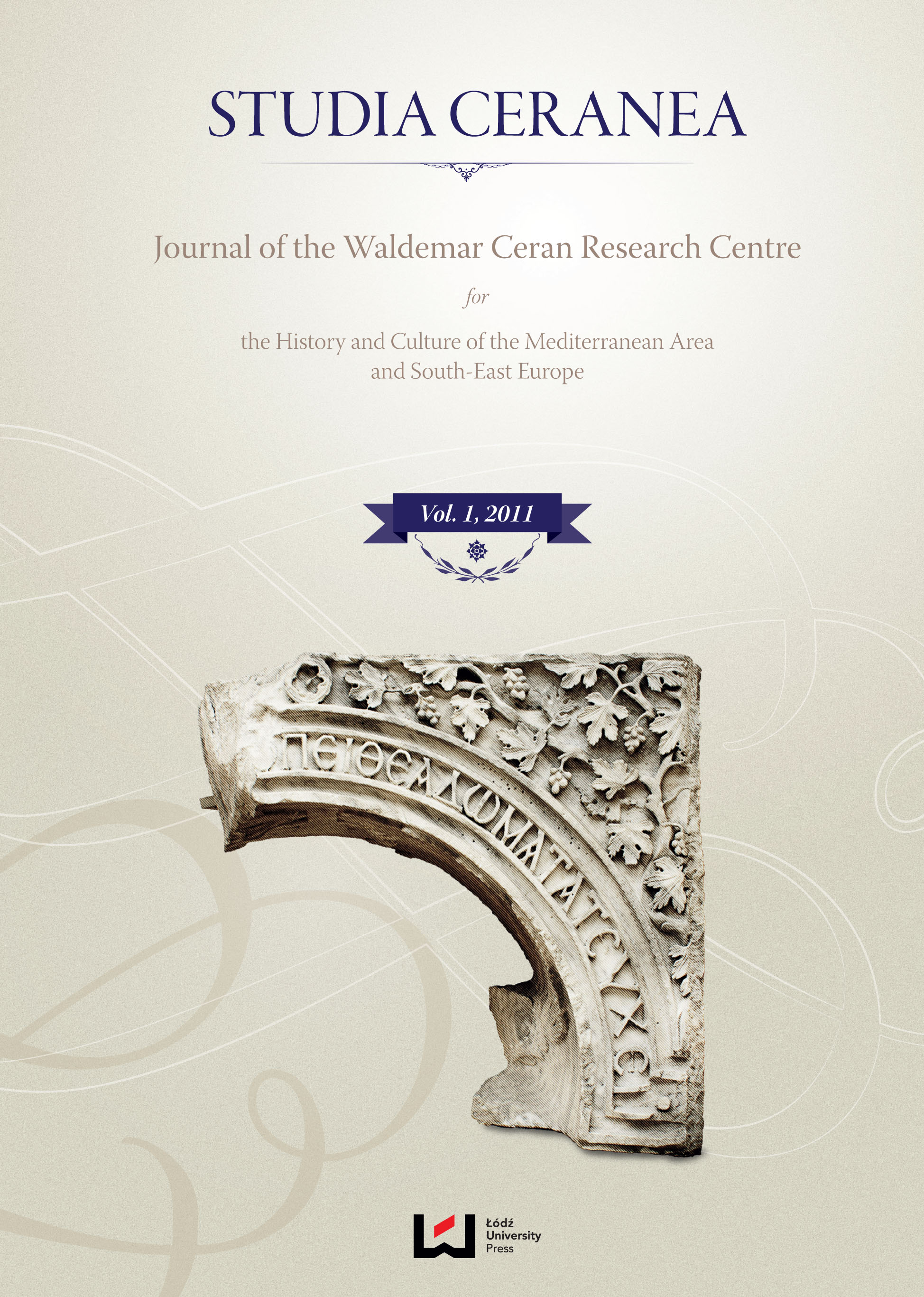The Porphyry Column in Constantinople and Тhe Relics of the True Cross
DOI:
https://doi.org/10.18778/2084-140X.01.06Abstract
The complicated fates of the Porphyry Column of emperor Constantine resemble the reach and difficult history of Constantinople, the New Rome and capital of the eastern Empire from its very beginnings. Perceived by the Constantinopolitans as both Christian and pagan monument, adorned with legends repeated and enriched by generations, it was always a landmark of the city. The article summarizes, compares and analyzes the accounts of Byzantine historians, showing continuity of tradition and the lasting role of the unique object in the very heart of political centre of the imperial capital.
Downloads
References
Alföldi A., On the foundation of Constantinople, a few notes, „Journal of Roman Studies” 37, 1947.
Google Scholar
S. Andreae Sali vita auctore Nicephoro, sancti directore et confessario, [in:] Patrologia Graeca, vol. CXI.
Google Scholar
Anne Comnéne, Alexiade, ed. B. Leib, Paris 1968.
Google Scholar
Baert B., A Heritage of Holy Wood. The Legend of the True Cross in Text and Image, Leiden 2004.
Google Scholar
Barnes T.D., Athanasius and Constantius, Cambridge 1993.
Google Scholar
Bassett S., The Urban Image of Late Antique Constantinople, Cambridge 2004.
Google Scholar
Borgehammar S., How the Holy Cross was found. From the event to medieval legend, Stockholm 1991.
Google Scholar
Bralewski S., Obraz papiestwa w historiografii kościelnej wczesnego Bizancjum, Łódź 2006.
Google Scholar
Chadwick H., Kościół w epoce wczesnego chrześcijaństwa, trans. A. Wypustek, Warszawa 2004.
Google Scholar
Chesnut G.F., The first Christian Histories: Eusebius, Socrates, Sozomenus, Theodoret, and Evagrius, Paris 1977.
Google Scholar
Chronicon Paschale, ed. L. Dindorf, Bonnae 1832.
Google Scholar
Codex Theodosianus, ed. P. Krueger, Berolini 1923.
Google Scholar
Cyril of Jerusalem, Catechesis, [in:] Patrologia Graeca, vol. XXXIII.
Google Scholar
Dagron G., Naissance d’une capitale. Constantinople et ses institutions de 330 à 451, Paris 1974.
Google Scholar
Diehl C., De quelques croyances byzantines sur la fin de Constantinople, „Byzantinische Zeitschrift” 30, 1929/1930, p. 192–196.
Google Scholar
Doukas, Historia Byzantina, ed. I. Bekker, Bonnae 1834.
Google Scholar
Drake H.A., Eusebius on the True Cross, „Journal of Ecclesiastical History” 36, 1985, p. 1–22.
Google Scholar
Drijvers J.W., Helena Augusta. The mother of Constantine the Great and the legend of her finding of the True Cross, Leiden–New York–København–Köln 1992.
Google Scholar
Dvornik F., Bizancjum a prymat Rzymu, trans. M. Radożycka, Warszawa 1985.
Google Scholar
Eusebius, Vita Constantini, ed. F. Winkelmann, Berlin 1992.
Google Scholar
Fowden G., Constantine’s Porphyry Column: the earliest literary allusion, „Journal of Roman Studies” 81, 1991.
Google Scholar
Frolow A., La dédicace de Constantinople dans la tradition byzantine, „Revue de l’histoire des religions” 127, 1944.
Google Scholar
Georgius Cedrenus, Historiarum compendium, ed. I. Bekker, Bonnae 1838,.
Google Scholar
Georgius Monachus, Chronicon, ed. C. de Boor, Lipsiae 1904.
Google Scholar
Guidi M., Un Bios di Constantino, Rome 1908.
Google Scholar
Hesychius Illustrius, Patria Constantinopoleos, [in:] Scriptores originum Constantinopolitanarum, ed. T. Preger, vol. I, Lipsiae 1901.
Google Scholar
Hurbanič M., História a mýtus. Avarský útok na Konštantinopol roku 626 v legendach, Prešov 2010.
Google Scholar
Ioannis Malalae Chronographia, rec. I. Thurn, Berolini–Novi Eboraci 2000.
Google Scholar
Ioannis Zonarae Epitome historiarum libri XIII–XVIII, vol. III, ed. Th. BüttnerWobst, Bonnae 1897.
Google Scholar
Janin R., Constantinople byzantine. Développement urbain et répertoire topographique, Paris 1950.
Google Scholar
Janiszewski P., Żywioły wsłużbie propagandy, czyli po czyjej stronie stoi Bóg. Studium klęsk i rzadkich fenomenów przyrodniczych u historyków Kościoła w IV i V wieku, [in:] Chrześcijaństwo u schyłku starożytności, vol. III, ed. E.Wipszycka, Kraków 2000.
Google Scholar
Kazhdan A., „Constantin imaginaire”: Byzantine Legends of the ninth century about Constantine the Great, „Byzantion” 57, 1987.
Google Scholar
Klein H.A., Byzanz, der Westen und das ‘wahre’ Kreuz. Die Geschichte einer Reliquie und ihrer künstlerischen Fassung in Byzanz und im Abendland, Wiesbaden 2004.
Google Scholar
Leo Grammaticus, Chronographia, ed. I. Bekker, Bonnae 1842.
Google Scholar
Mango C., Constantinopolitana, „Jahrbuch des Deutschen Archäologischen Instituts” 80, 1965, p. 312–313.
Google Scholar
Mango C., Le développement urbain de Constantinople (IVe –VIIe siècles), Paris 1985.
Google Scholar
Mango C., Constantine’s Porphyry Column and the Chapel of St. Constantine, [in:] idem, Studies on Constantinople, Aldershot 1993, art. IV, p. 104.
Google Scholar
Michael Glykas, Annales, ed. I. Bekker, Bonnae 1836.
Google Scholar
Miller K., Itineraria Romana, römische Reisewege an der Hand der Tabula Peutingeriana, Stuttgart 1916.
Google Scholar
Nicephorus Callistus Xanthopoulos, Historia ecclesiastica, [in:] Patrologia Graeca, vol. CXLV.
Google Scholar
van Nuffelen P., Un héritage de Paix et de Piété. Étude sur les histoires ecclésiastiques de Socrate et de Sozomène, Leuven–Paris–Dudley 2004.
Google Scholar
Philostorgius, Kirchengeschichte. Mit dem Leben des Lucian on Antiochien und den Fragmenten eines arianischen Historiographen, ed. J. Bidez, F. Winkelmann, Berlin 1981.
Google Scholar
Procopius Caesariensis, De bello Gothico, [in:] Procopii Caesariensis opera omnia, ed. G. Wirth, J. Haury, Leipzig 1963.
Google Scholar
Pseudo-Codinus, Patria Constantinopoleos, [in:] Scriptores originum Constantinopolitanarum, ed. T. Preger, vol. II, Lipsiae 1907.
Google Scholar
Salamon M., Rozwój idei Rzymu–Konstantynopola od IV do pierwszej połowy VI wieku, Katowice 1975.
Google Scholar
Sokrates Scholastyk, Historia Kościoła, trans. S. Kazikowski, intr. E. Wipszycka, comm. A. Ziółkowski, Warszawa 1986.
Google Scholar
Sozomène, Histoire ecclésiastique, ed. J. Bidez, Paris 1983.
Google Scholar
Theophanes, Chronographia, rec. C. de Boor, Lipsiae 1883.
Google Scholar
Toynbee J.M.C., Roma and Constantinopolis in late-antique art from 312 to 365, „Journal of Roman Studies” 37, 1947.
Google Scholar
Urbainczyk T., Observations on the differences between the Church Histories of Socrates and Sozomenus, „Historia. Zeitschrift für alte Geschichte” 46, 1997.
Google Scholar
Weber E., Tabula Peutingeriana, Poznań 1998.
Google Scholar
Young F., From Nicaea to Chalcedon, London 1983.
Google Scholar
Zosimus, Historia nova, ed. L. Mendelssohn, Lipsiae 1887.
Google Scholar
Downloads
Published
How to Cite
Issue
Section
License

This work is licensed under a Creative Commons Attribution-NonCommercial-NoDerivatives 4.0 International License.













